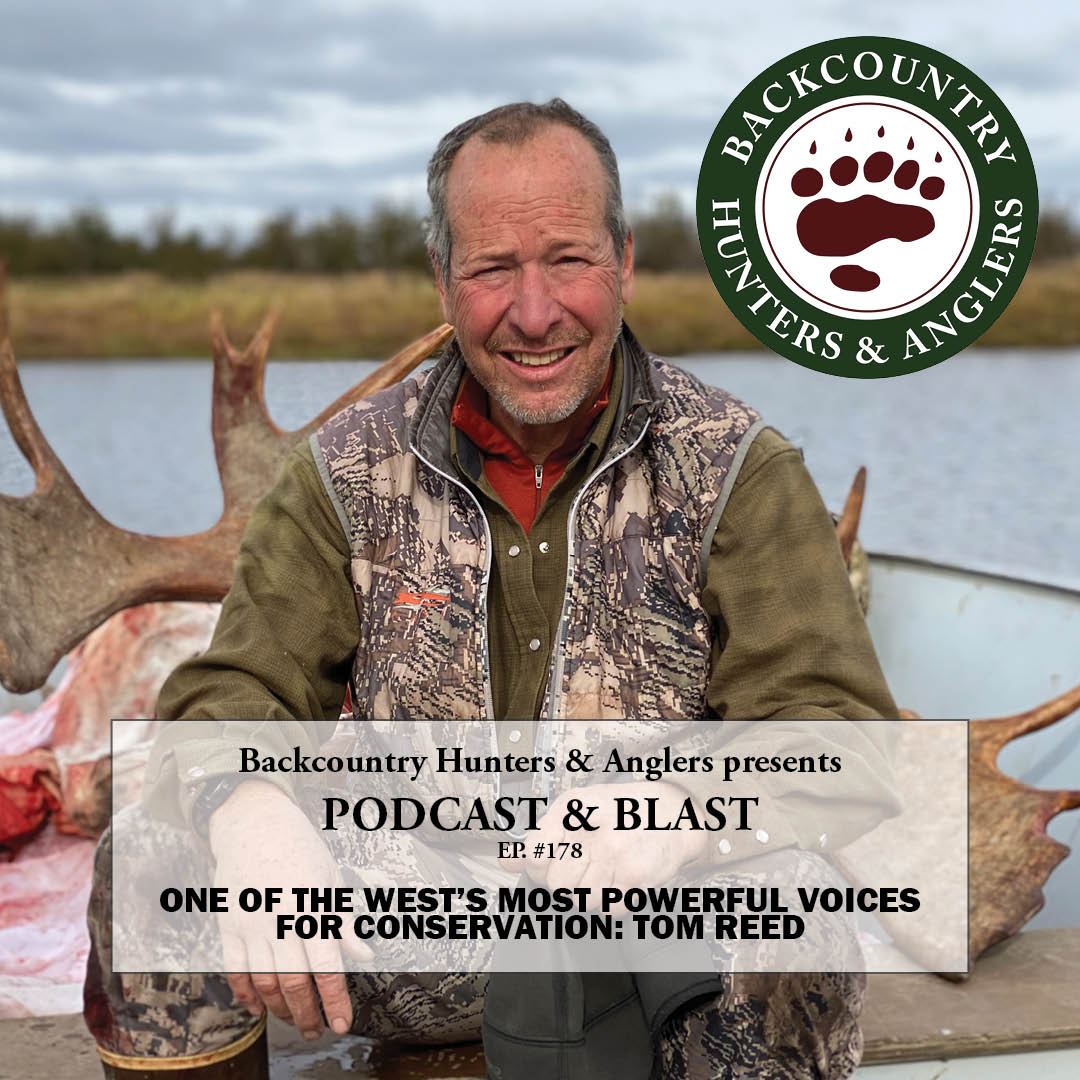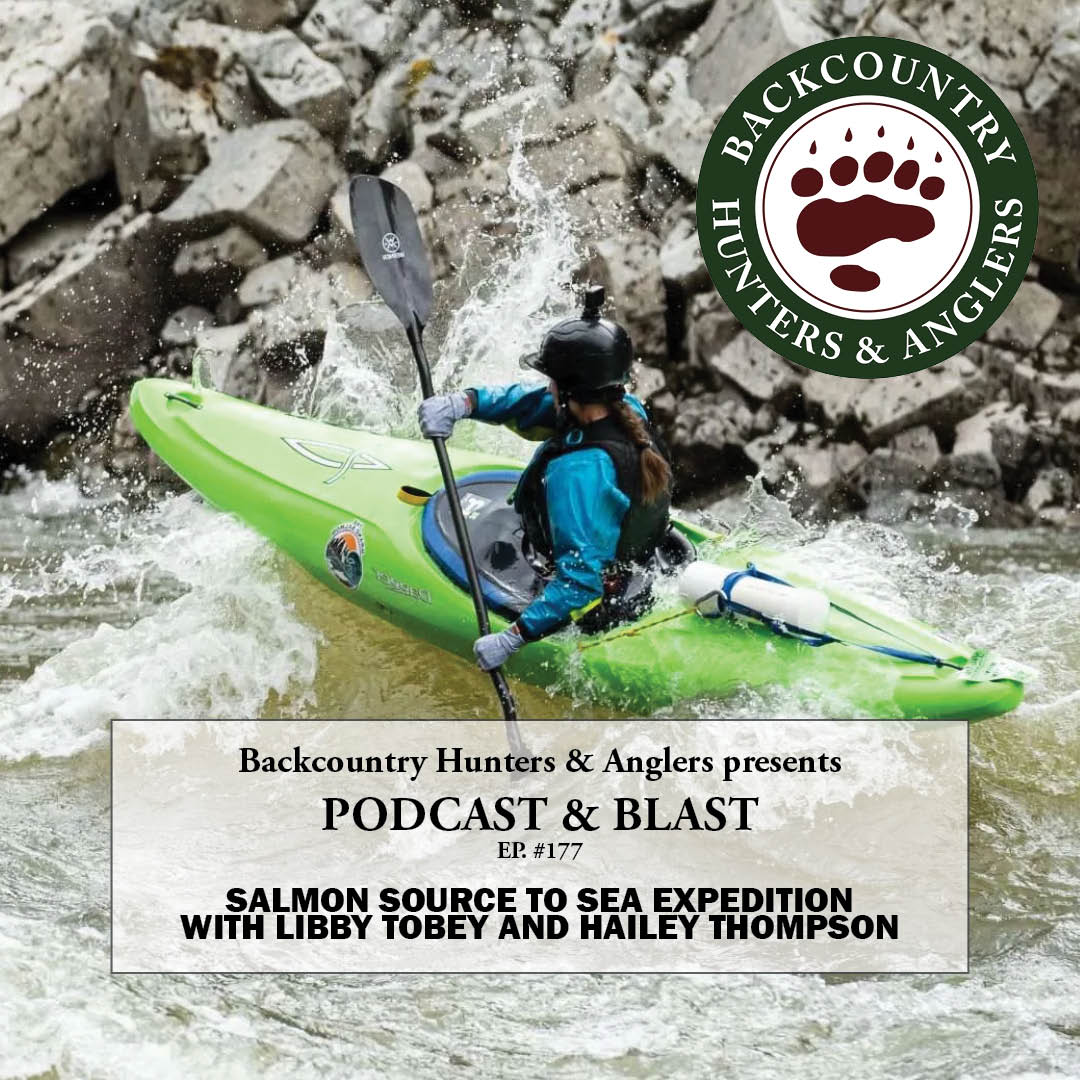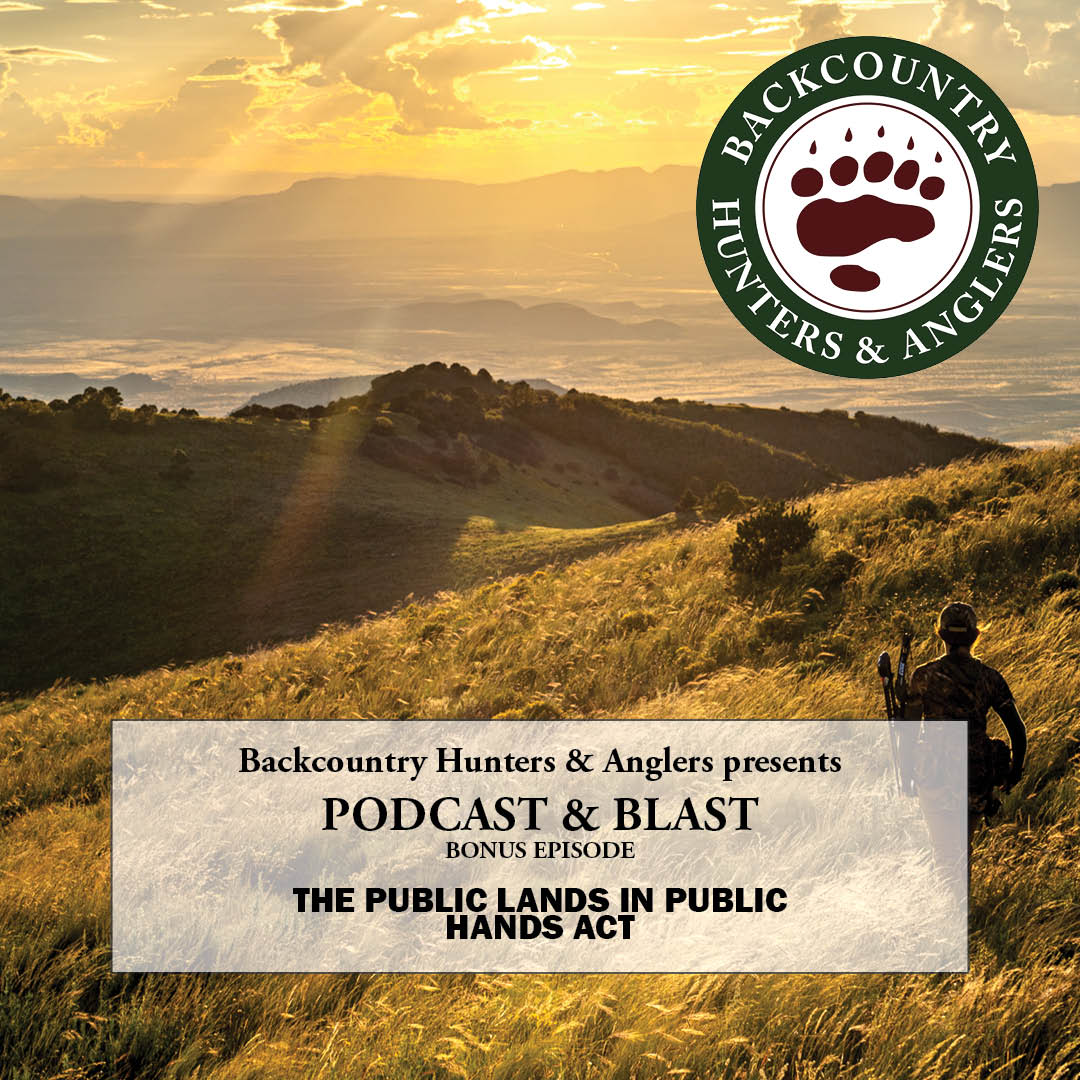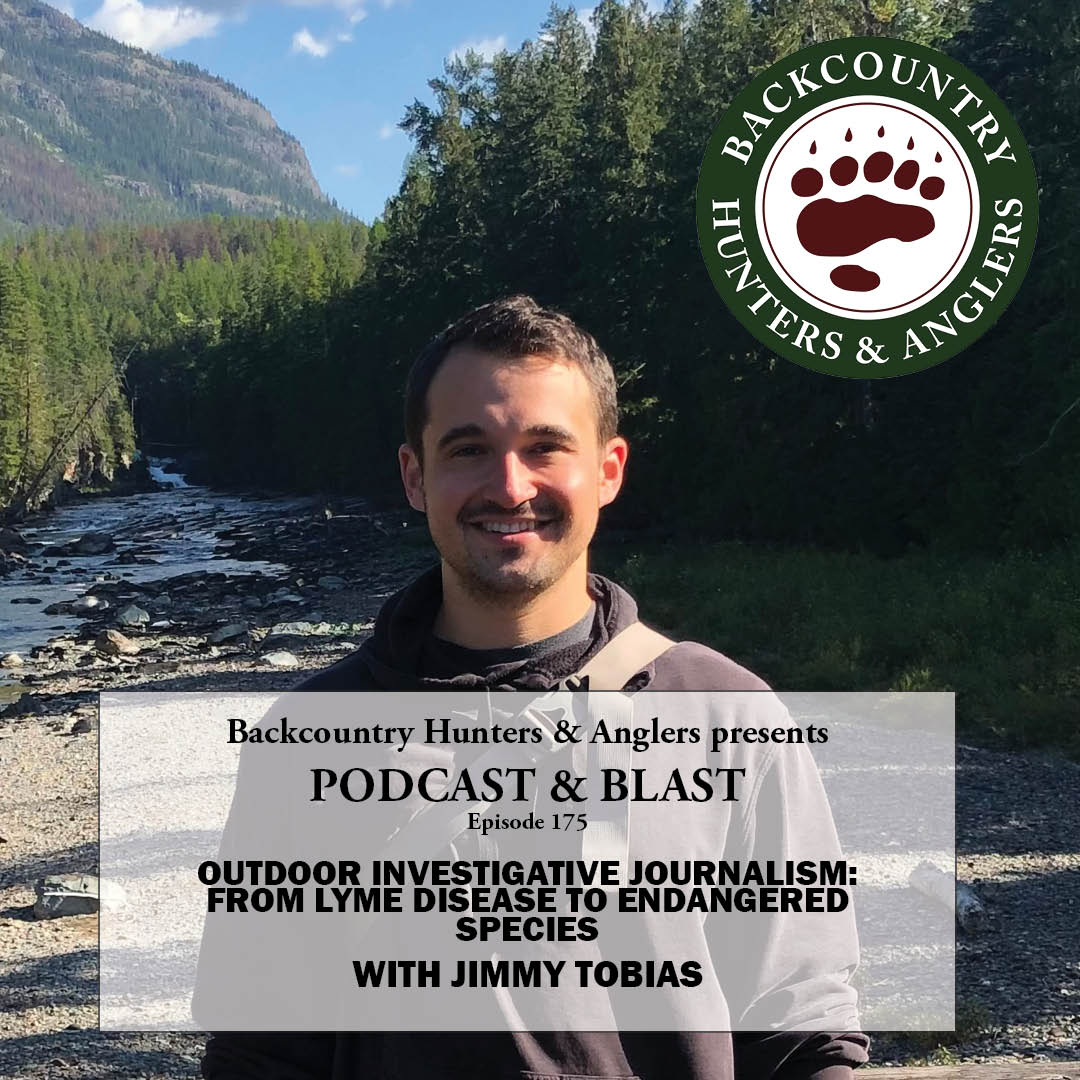Discover Backcountry Hunters & Anglers Podcast & Blast with Hal Herring
Backcountry Hunters & Anglers Podcast & Blast with Hal Herring

Backcountry Hunters & Anglers Podcast & Blast with Hal Herring
Author: Backcountry Hunters & Anglers
Subscribed: 1,767Played: 31,017Subscribe
Share
Description
Hunting. Angling. Public Lands. That's the meat of what BHA's Podcast & Blast with Hal Herring is about, and we cover the gamut. With guests that range from outdoor writers to backcountry hunters to legendary anglers, we seek to uncover the stories, the truths, the controversies, and the epic conversations that our public land heritage provides.
181 Episodes
Reverse
Tom Reed, of Harrison, Montana, is a founding board member of Backcountry Hunters and Anglers and a true son of the Western plains and Rocky Mountain wilderness. Born in Colorado, Tom worked as a horse and mule packer and a small-town reporter in Wyoming, edited a bass fishing magazine in Arizona, spent years with Wyoming Fish and Game as writer and editor. Throughout his life, he’s pursued the foundational passions that drove him as a youngster- horses, hunting and fishing, wilderness, dogs, good guns, family. And he’s written beautifully about it all, in books like Great Wyoming Bear Stories, Blue Lines, and Give Me Mountains for My Horses, and in hundreds of columns and stories for Trout magazine, Wyoming Wildlife, Mouthful of Feathers and many other publications. Join us in a conversation with one of the American West’s most powerful voices for conservation and public lands, recorded in Tom’s writing cabin on the backside of the Tobacco Root Mountains.
In April of 2022, Libby Tobey, Hailey Thompson and Brooke Hess skied into Marsh Creek in Idaho’s Sawtooth Range, towing their kayaks and a sled full of camping gear. The goal: trace the route of anadromous fish from the source of the Salmon River to the Pacific Ocean and advocate removing the four dams on the Lower Snake River that block that migration and are killing that river system. 78 days and 1000 miles away down the tiniest tributaries to the massive whitewater of the main rivers, through soul-killing paddling slogs in dead impoundments, portages amid highways and traffic, wind and sun, joy and tribulation, they found themselves on a spit of sand and mud at the mouth of the Columbia, drinking champagne amid wind-driven waves of salt water. Hal caught up with Libby Tobey in Idaho and with Hailey Thompson in Alaska for an account of the adventure, and a discussion of what is at stake in the debate over the fate of the lower Snake River dams.
Representative Ryan Zinke (R-MT) and Representative Gabe Vasquez (D-NM) are co-sponsoring The ‘Public Lands in Public Hands Act” which would ban the sale or transfer of most public lands managed by the Department of the Interior or the Department of Agriculture (which includes the vast majority of federal public lands – Bureau of Land Management is under Interior and the National Forests are under Agriculture). The bill also requires Congressional approval for disposals of publicly accessible federal land tracts over 300 acres and for public land tracts over five acres if accessible via a public waterway. Are we witnessing the beginning of a bipartisan consensus on the value of our federal public lands? What motivated these two Western Congressmen to draft and sponsor this bill? Does it have a chance to become law? Join us for the answers to these questions and a lot more. Read the bill here: https://drive.google.com/file/d/12Z21FJ6XLZwyma9qaDajehFH1luY2xxa/view Read the press release from New Mexico Representative Gabe Vasquez: https://vasquez.house.gov/media/press-releases/vasquez-introduces-bipartisan-public-lands-public-hands-act Read the press release from Montana Rep. Zinke: https://zinke.house.gov/media/press-releases/zinke-introduces-bipartisan-public-lands-public-hands-act
Jim Heffelfinger, Arizona Game and Fish Wildlife Science Co-ordinator, Chairman of the Mule Deer Working Group, wildlife conservation professional, author of Deer of the Southwest. Coming at you live from the 2024 Mule Deer Expo in Salt Lake City, Hal catches up with one of America’s rockstars of wildlife conservation and research, Arizona’s Jim Heffelfinger. The conversation roams and wanders, from mule deer and blacktails, habitat and CWD, to Mexican wolves and hunting javelina, with a side trip into the mystique and glory of the Colt 1911. If you have half as much fun listening to it as Jim and Hal had recording it, this episode will rank among the best ever. Also, this episode celebrates the publication of the comprehensive textbook, Ecology and Management of Blacktailed and Mule Deer of North America, which Jim co-edited. Hal and Jim forgot to talk about the book, but it is a crucial resource for anyone interested in the current state and likely future of our mule deer and blacktails.
Journalist Jimmy Tobias started out working on backcountry trails for the US Forest Service and Montana Conservation Corps. Since then, he has become one of America’s hardest-hitting investigative reporters specializing in public lands, conservation, and the outdoors. Tobias’ story about the link between ecosystem disruption and tick-borne illnesses, “How Lyme Disease Became Unstoppable,” was published in June 2022 in The Nation. That story was the original inspiration for this interview, but Hal and Jimmy range far afield, from ticks to endangered species protection and the Heritage Foundation’s Project 2025, which promises to dismantle federal public lands and their management once and for all. Join us.
Join Hal and BHA North American Board Member and CEO of the Orianne Society Dr. Chris Jenkins for a fascinating conversation about everything from public lands and local hunting and food to Dr. Jenkins' specialty: venomous snakes. An episode you don't want to miss!
The largest public lands conservation opportunity in our lifetime is at hand. The Bureau of Land Management is finalizing plans for the long-term management of an expanse of public lands in Alaska that is larger than the state of Ohio. There are 28 million acres at stake, an unfathomable wealth of wildlife, big game, fisheries, waterfowl, and the headwaters of rivers like the Kuskokwim and the Yukon. These are known as the D1 Lands, protected from mining and energy development by the Alaska Native Claims Settlement Act of 1971. In 2020, the management of these lands was thrown into limbo. Now, the BLM is asking for the American people to determine the future of these lands. Join us to learn more, as Hal interviews Alaskan Rachel James, of Salmon State. And then be sure to comment through BHA's Action Alert.
Learn more about what goes on in the halls of Congress as Hal sits down with BHA Government Relations Manager Kaden McArthur to discuss the 2023 wins BHA played a role in achieving for the conservation of our public lands and waters.
Douglas Tallamy, Chair of the Department of Entomology and Wildlife Ecology, University of Delaware Any hunter, angler and/or student of the natural world is bound to be more than a little gobsmacked by the rate of development and growth that we see all around us: Bozeman, Atlanta, Boise, Moab, Salt Lake City, Huntsville, Austin, the Gulf Coast, Phoenix, Chattanooga, Asheville and beyond. Is there any hope for the wild places and the world we love? Hell, yes there is. And it will be done by each and every one of us – yard by yard, deck by deck, square foot by square foot. The possibilities are endless. Doug Tallamy, of the Homegrown National Park movement is the author of Nature’s Best Hope (with a companion volume for younger readers and Bringing Nature Home. Doug has a plan to create 22 million acres of native plant communities that will restore whole kingdoms of birds, insects, reptiles and other wildlife, at almost no cost, and with no need to beseech the government or beg alms of the powers that be. Join us, for a damn good time, and learn about a work that anyone can love and a movement that everybody can be part of. If you hang around to the end, you’ll get outlandish insect tales, for no extra investment. And because this interview was so much fun, we’ve got another one scheduled with Doug to talk about his new book on Oak trees – all 600 species of them – and his obsession with the mysterious universe of gall wasps. Your mind will be blown.
Join Hal Herring and Mississippi State University environmental history professor and author of My Work is that of Conservation, An Environmental Biography of George Washington Carver Mark Hersey for a fantastic American conservation story that has never been more relevant than it is right now. If you finished seventh grade in an American public school, you learned about George Washington Carver, who was born into slavery in Missouri and grew up to be one of America’s leading scientists and agronomists, working from his laboratory at Tuskegee University in Alabama. Carver was a friend and advisor to U.S. presidents, including Theodore Roosevelt, and sought out as counsel by some of the best minds in agriculture across the world. Carver was also one of America’s pioneers of the science of ecology and a cutting-edge conservationist who advocated for the restoration of whitetail deer, quail and fisheries, long before such ideas became mainstream. His conservation vision was forged in the fire of his own history and in his life’s work in Alabama’s post-slavery Black Belt and along the Fall Line, known then as “the most destroyed land in all of the South” -- a place where poverty, injustice and hunger were closely tied to the abuse and collapse of the systems of the earth. Don't miss Hal's fascinating conversation with Mark Hersey.
Listeners to the BHA Podcast & Blast will likely know Erin Block from her brilliant short essays at MidCurrent, Gray’s Sporting Journal, Field & Stream, and TROUT magazine, where she is an editor-at-large. Some might know her books on the the art of making bamboo fly rods (The View from Coal Creek), or By a Thread: A Retrospective on Women and Fly Tying. Some might follow her Instagram, a powerfully understated immersion in foraging, wildlife and birds, hunting and fishing and gardening. Erin’s writing comes directly from the well-spring of her life, and like the chronicle of any real life, it is always about more than meets the eye. Hal talks with Erin from her cabin in the Colorado Rockies, about her new book of poetry https://www.middlecreekpublishing.com/how-you-walk-alone-in-the-dark , the ancient art of ekphrasis, which may be finding its truest heights right now, a special old Savage shotgun and a whole lot more. Grab a cup of coffee and join us.
If you are an upland bird hunter with a yen for great writing and vividly lived experiences, you have probably been reading the Mouthful of Feathers crew -- Tom Reed, Marissa Jensen and Greg McReynolds -- on the internet since 2009. Whether you have or have not, you are in for a treat. Join us for a celebration of wild birds and wild dogs and their first publication, in a book that you can hold in your hands, of the best of the best of the Mouthful of Feathers short essays and stories. The book is the perfect off-season reading: 20 writers from all walks of life and all over North America. It’s old friends and old and young dogs, venerable old double barrels and pawnshop pump shotguns with stocks cracked from a tumble down the chukar’s steepest basalt. It’s bobwhites and sharptails, Huns and timberdoodles and Mearn’s, from the southern longleaf to the rain-soaked poplars of Michigan, the Sandhills to the Madrean Sky Islands. And the conversation in epidode 169 of Backcountry Hunters & Anglers’ Podcast & Blast is one hell of a good time.
The proposed Ambler Road is a proposed 211-mile industrial corridor through public lands along the southern flanks of the Brooks Range and one of the last and largest protected roadless areas on earth. The road would be built from the Dalton Highway to the Ambler Mining District on the Ambler River, passing through the Gates of the Arctic National Park and Preserve, bisecting the migration route of the embattled Western Arctic caribou herd and crossing nearly 3,000 streams and 11 major rivers including the Kobuk and Koyukon. Tune in to learn about this proposed project from three deeply concerned Alaskans while there is still time for hunters and anglers like you to make your voices heard.
Public Lands, Wild Game Cooking, Hunting, Angling and Conservation – Live from the Texas Hill Country with Chuck Naiser, Jesse Griffiths and Riverhorse Nakadate The Podcast and Blast has gone to Texas! Host Hal Herring takes the Podcast & Blast on the road to the sunbaked Texas Hill Country to record a live episode at Star Hill Ranch in Bee Cave. It’s a packed house at the Texas BHA gathering for a conservation conversation fueled by extraordinary food, ice cold beer and a rip-roaring good time. Riverhorse Nakadate is a writer, poet and musician telling the story of public lands, flyfishing and conservation from the Texas Gulf Coast to the Boundary Waters. Jessie Griffiths is a visionary wild game chef, forager, hunter and angler, restaurateur and author. Chuck Naiser is president and founder of Flatsworthy, a coalition of sometimes conflicting stakeholders committed to solving the major challenges of a booming Gulf Coast and has been a renowned fishing guide and a successful battler for conservation on the Texas coast since he took a leading and often dangerous role in the “Redfish Wars” of the late 70s. He’s as plain-spoken and passionate as ever, at a time when his wisdom and experience are needed more than ever. Join us for a conversation with the three recent Texas BHA Public Lands and Public Waters Leadership Award recipients.
Listeners of the podcast will remember a number of dam-focused episodes over the past few years, Free the Ocklawaha (Florida) and Snake River Dams (Idaho, Columbia River basin) to name just two. But the issue of dams – the blocking of the arterial systems of the earth – is not about just a few high-profile cases. More than 800,000 dams across the planet have destroyed river systems, extirpated vast runs of native fish, displaced millions of human beings and drowned priceless farmlands, forests, prairies and wetlands. The delusion that we can plug living river systems and somehow turn them into money has perverted politics and economies and stolen the wealth of nations, hoarding it into the hands of the privileged and well-connected few. The story of dams – an incredible tale of careless hubris, blatant corruption and tragically bad ideas – is one [stevenhawleyauthor.com]Steven Hawley has been chronicling its unfolding for decades now, long enough to see a new clarity rising, and with it a growing movement to remove old dams and restore the free-flowing energies and arterial systems of our planet. Hawley’s new book, Cracked: The Future of Dams in a Hot, Chaotic World, chronicles this history and future. Each success (and there are many of them) brings into stark focus the path forward, restoring rivers and fish runs and floodplains, reawakening the deep relationship between humankind and the waters that sustain us. Join Hal and Steven for a spirited exploration of one of the most critical issues of our time.
Coho salmon habitat, wetlands conservation, the removal of abandoned fences that kill hundreds of migrating mule deer, pronghorn and elk every year. Marine Corps helicopters and bighorn sheep, fish counts, bowfishing for alligator gar, restoring native plants on burned-over public lands. A ton of good work is getting done on our public lands and waters, and people are having a blast doing it. This is the reality of BHA’s hands-on conservation: projects done by real people; sweat, dust, sunshine and rain; like-minded folks coming together, seeing new country and leaving it quantifiably better than we found it. Hal joins Britt Parker, BHA’s habitat stewardship coordinator in Colorado, and Devon O’Dea, BHA California coordinator, to talk about the latest projects, check out the big future, and learn how you can get involved.
Dave Simonett of Trampled by Turtles is a Minnesota fisherman, hunter and dog man, a former roofer, and one of America’s most profound songwriters and hardest-touring musicians. Hal and Dave spent a morning fishing Montana’s Big Blackfoot this summer, throwing spruce moth bugs for cuttbows and browns, and then caught up in the afternoon for a conversation at the KettleHouse Amphitheater in Bonner, Montana. Dave was getting ready to rock a sold-out crowd in the beautiful summer gloaming, with the river running fast and cold in the near distance. Sometimes, it just all works out. Join us.
The longhunters of the 18th century knew it well. The Native nations of the Southeast knew it better yet, lived upon its bounty of bison and elk, and maintained it with fire and the deliberate cultivation of hundreds of species of plants. It was the Southeastern Grasslands Complex, known now only from the oldest maps. But remnants exist, of the most vibrant American ecosystem ever recorded, and Dwayne Estes and Jeremy French from the Southeastern Grasslands Institute are here to talk about the current successful efforts to understand it…and bring it back.
There is a dire misconception these days that hunting and angling are somehow the birthright of Americans – and that these life pursuits and passions of ours belong to us by dint of benevolent magic or extraordinary good luck. American hunting and fishing do not exist because of magic or luck. We have what we have because our forebears raised relentless hell to restore our wildlife and protect our lands, waters and air. Ben Long, hardcore hunter, angler, conservationist, writer and longtime BHA leader, has produced The Hunter & Angler Field Guide to Raising Hell to re-awaken that spirit right now…when the need has never been greater. In the tradition of Thomas Paine’s Common Sense, the epic of compression that launched the American Revolution, Ben’s Field Guide is a concise user’s guide to the institutions – from federal agencies to the courts – that help us protect that which we refuse to relinquish, and that which we will pass on to the generations that follow us. To whom much has been given, much is expected. Join us, in the fight, and for this conversation.
Texas hunter and fisherman Jesse Griffiths is the author of Afield: A Chef’s Guide to Preparing and Cooking Wild Game and Fish and The Hog Book, the definitive text – artwork is closer to the reality - on hunting, butchering and cooking feral hogs. The Hog Book won the prestigious James Beard Award in 2022, a fitting tribute to a man on the cutting edge of wild game and fish cookery. Jesse is co-owner of the Austin, Texas, New School of Traditional Cookery and the restaurant Dai Due, whose name is drawn from the Italian proverb, Dai due regni di natura, piglia il cibo con misura: “From the two kingdoms of nature, choose food with care.” Join us for a conversation with one of the most visionary chefs in North America, talking hogs, turkeys, panfish, hunting and fishing and foraging for food, and a life defined by the earth and her seasons.
























sweet Jesus did this episode hit me like a broadside. I WAS an E4 Specialist Medic in a Stryker. Somehow in my VA paperwork (I have zero idea where the number came from?) I was exposed to 24 TBI-grade blasts (that was one deployment).